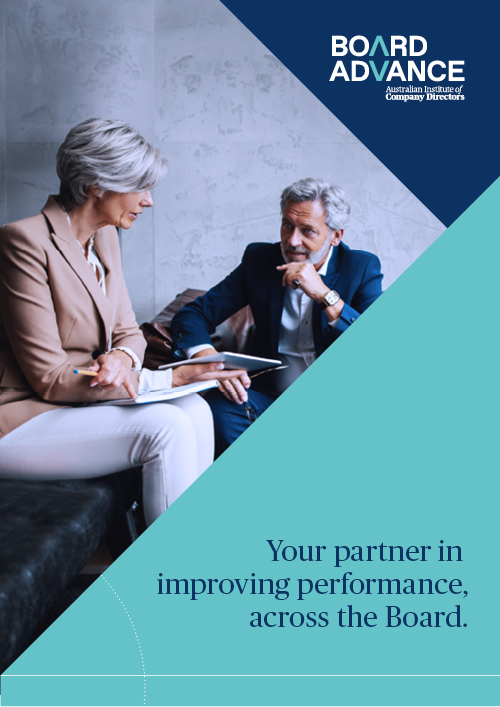In 2021, Australian Sporting Commission (ASC) chair Josephine Sukkar AM AAICD was worried about Kieren Perkins OAM. One of Australia’s most recognisable public figures, the former Olympian had just started as the president of Swimming Australia, where he’d inherited a governance and media crisis. His resilience stayed with her. She was convinced he could pioneer a new era for sport as the ASC’s next CEO.
On the eve of the 2024 Paris Summer Olympics and Sukkar’s retirement from the commission, Sukkar and Perkins reflect on how a relationship borne of shared values has helped the organisation redefine Australia’s sporting culture from winning at all costs to winning well.
Josephine Sukkar AM AAICD
The chair’s POV
My working relationship with Kieren began when I reached out to him as the Swimming Australia board was dealing with a public matter. [In 2021, Swimming Australia commissioned an independent report to “better understand the experiences of women and girls within the sport” following public complaint.] It became so personal and so nasty, and Kieren had only been president for a number of months.
If I had to imagine a perfect face for the Swimming Australia president role, it would probably be Kieren Perkins. He wasn’t being paid — he was offering his time for nothing — and he was five minutes into the role, saying, “I’m president. I am therefore ultimately responsible. All this lies with me to fix and to take accountability for.”
I reached out to him to say, “Are you OK?” and offered my help. The way he responded was not with anger or to point out that the situation wasn’t fair. He said, “It’s what I put my hand up for.” It was dispassionate and I could clearly see it was hard to deal with. He is not someone who wears his heart on his sleeve, rather, he is quite restrained in how he presents himself. The way he chose to respond to that situation stayed with me.
Eventually, when I was looking at the longlist for prospective ASC CEOs, I saw the search firm had asked Kieren and he had declined. I decided to pick up the phone and say, “I think you should have a look at this role.”
Recruiting for diverse skill sets
If we both had the same skills and the same lived experience, we would have provided a narrower partnership to lead the sector with. I like to think that means one plus one equals three. We know and respect each other’s strengths and skills. There’s Kieren’s experience as an athlete and also his corporate experience at NAB and elsewhere. We’re a big organisation, over 500 people, and that’s not an easy thing to lead.
You can’t discount his profile. He really does have the respect of Australians and the government. When we’re visiting Parliament House some days, I say, “I’m not walking out with you. It’s going to take me an hour to get from where we are to the front door.” Everyone’s wanting a selfie and to tell him where they were the day he won the gold medal in Atlanta. It’s really quite lovely.
He’s very professional. He presents himself in a way that makes me proud he is leading the organisation — and I hope it makes the sector proud. That is one of the many reasons I wanted him in the role. I wanted sports administrators, coaches, athletes and corporate figures to look at the head of the ASC and see the role as something they aspire to. The CEO of the ASC should clearly be the leader of the sector because, working in partnership with the government, which is the largest funder of sports, it’s a pretty powerful role. You want the right person — someone who respects the authority and influence that comes with the role, but also somebody who can inspire others to join the organisation.
Shared challenges
Externally, we were trying to provide the sector with clarity on how to liaise with the federal government. If you’re a national sporting organisation (NSO) and you want more money, your chair could probably pick up the phone and get hold of the Prime Minister — depending on the organisation and the context. Compare that to little Olympic sports, which run on the smell of an oily rag.
The sector was confused and distrustful about how to obtain funding and engage with us. We needed to guide leaders on properly approaching government interactions. We had to earn the trust of the sector and they were actually amazing, by and large.
A sector-wide strategy
When I arrived at the ASC, I thought some of the ways the sports sector was showing up weren’t appropriate, compared to how I was presenting myself in my career at Buildcorp. For example, when there was a change of government, incoming Minister for Sport Anika Wells received hundreds of phone calls within an hour from different sports, with instructions telling her what to do and requesting meetings. We were not showing up well.
I was very clear and communicated that the way forward in engaging with the government was to provide Wells with one voice. That’s Kieren Perkins. I strongly encouraged the sector to get together. We needed to make ourselves look better because frankly, at the very top of sports, we were behaving appallingly. If we were going to succeed in providing clarity on how we turn up in our sector, it had to be through Kieren.
The sector’s response was amazing. They all came together — national and state organisations, Australian Olympic Committee, Paralympics Australia and Commonwealth Games. They crafted one vision for high performance — “Win Well” — and a strategy for participation — “Play Well”. As far as I can remember, it was the first time that had ever happened in the history of sport. Everyone had to give a bit. I acknowledged it wouldn’t be easy, but they did it. Now, we just need the government to fund the strategy and we’ll be there.
Chair to chair
My advice to the next chair is the same advice I’d give anybody taking on a leadership role — come into it with courage.
I don’t know if I’d have had the courage to do this role 10 years ago — to have some of the conversations and make some of the decisions I’ve made as the 60-year-old woman I am today.
That said, only use courage if you think the decision you’re making is the right and honourable one, not just your opinion. Because not all of your decisions are going to be right, but you can live with them if you made them with the right intention.
Kieren Perkins OAM
The CEO’s POV
The Swimming Australia experience allowed me to look to Josephine as a bit of a sounding board. To be able to hold the line on doing the right thing, addressing human issues, acknowledging the risks facing the organisation, while still prioritising important outcomes was really valuable.
I actually started interacting with Josephine on a regular basis to keep a stakeholder informed and engaged. And, to be honest, to get some support around the leadership challenge, because sport is quite a unique environment.
From the outset, it was clear we had a fairly good alignment of value sets and expectations around what “good” looks like. I believe that she understands and trusts my intent and the values behind how I approach things. She provides me with the guidance and the leadership push to deliver on the very difficult adaptive challenges that exist in the sporting environment.
Doing well
Developing the “Win Well” strategy has been an interesting journey. You come into an organisation and, to an extent, you assume there is a strategic alignment that enables the broader stakeholder group to know where you’re going.
It was eye-opening to arrive and realise that there hadn’t been any co-created strategic work done for the high-performance sector — there had never been any in the community.
But it enabled the new leadership, myself and Josephine, to join and say, “This is where we need to go. Let’s do this together.”
The “Play Well” and “Win Well” strategy work really did open the door to a different type of engagement with our stakeholders. There’s an enormous amount of acknowledgement and recognition around inclusivity and equity, and focusing on the health and wellbeing of everyone involved in sport.
This not only enables athletes to perform at the highest level, but when they’re on the other side of their career, they’re also clear that they’re better off for their exposure and engagement in sport.
The tension point is that we are an organisation that deploys funds that the federal government wants to see invested into sport nationally — and to see it perform.
However, at the end of the day, the sports we fund are asset-registered independent companies that need to be able to deploy their own strategic outcomes and have their own accountabilities to both regulators and their funder. And it is not easy, because a lot of those organisations are very small and don’t have strong capacity to develop talent, grow leadership and provide the capacity and space for strategic development.
We need to support them, not only in the delivery of any activity, but also in the development of capability. It is a really interesting leadership challenge to couple the investor dynamic with being a supportive and uplifting partner.
Governance edge
I honestly believe that with the right guidance and support, athletes learn all of those soft skills around performing as an individual and as a team, which takes people in a corporate career decades to develop. Athletes learn about stress management and delivering outcomes in highly competitive environments. Having that determination and resilience, the capacity to be selfish when it’s important and selfless when it’s better for the team — all of that stuff happens for athletes.
We’ve seen countless examples of sports people show their tremendous leadership capabilities even when unable to be part of the team on the field due to injury or other circumstances. The rest of the team benefits from that support, trust, resilience, extra resource and that confidence boost by having that key person around, rather than them disappearing as they were consumed by their own injury and ignoring what the rest of the team is doing.
It’s leadership personified — leading by example and with guidance, love and care, which can be deployed by other people to thrive and survive. Athletes have that experience in spades and it’s something they should be able to deploy in their work life, which should see them accelerate through their career much faster than someone who’s never had that.
Succession planning
The next CEO should be somebody who far better represents the current Australia than I do. I think that as it stands, sports representation is far too Anglo-Saxon and middle-to-high in socio-economic class. I’d like to think the next CEO has the skills basis and strategic acumen to lead sport into this next phase of where we’re going, but is also someone who is far more representative of the population — someone we can rely on to make sport the cornerstone of a thriving Australian culture.
Laps to leadership
As an athlete, the thing I wish I’d paid more attention to was the reality that my Olympic career was never going to provide financial outcomes that I could rely on for the rest of my life. It is first and foremost one of the greatest misnomers of sport that if you become a famous successful athlete, then you are financially set up for life. Now, that might be true for a very small number of athletes, who we all know because they’re famous, but for every one of those there are thousands of other athletes who commit as much time, effort, resources and family sacrifice – all of that stuff – and while they ultimately achieve amazing things, they’re not going to be able to lie on a beach for the rest of their lives. I’m certainly one of those athletes who faced that challenge, as are the vast majority of our Olympic, Commonwealth and Paralympic athletes. I wish I’d spent more time on education and professional development in the latter half of my athletic career, so that the transition to life after sport was better set up. Mine was better than most because I had sponsors. I did have commercial activity, which I was able to rely on for a period of time and that enabled me to adjust. It’s about shortening that transition cycle, so when you retire from sport, you’re not starting from zero. You’re still going to be behind people of the same age – that’s one of the things that gets missed. When people retire from sport, everybody else their age has been working at their career for a decade or longer. I look back now and I know my family tried to make me understand what was coming. If I had better mentorship and guidance around career development, I think that would have been really powerful. The place I needed that message to come from was from others who had walked in the same shoes.
The Win Well pledge
We commit to being an organisation that strives to win well, where how we win is just as important as when we win.
We commit to the holistic development of our athletes and our staff, recognising wellbeing as the foundation of sustainable success. We commit to leading sport with integrity, where we are accountable for the culture we foster and the decisions we make.
We commit to acknowledging and learning from Aboriginal and Torres Strait Islander Peoples and their cultures, and to walk together as we embed their knowledge and experience into our organisation and build a greater sense of belonging and connection to communities and country.
We commit to a culture of challenge and care so our athletes and staff can perform at their best and reach their potential.
We commit to creating safe and thriving environments for our people to fail so they can learn, grow and succeed.
We commit to being custodians of sport and building a legacy where sport is more inclusive and representative of the diversity of Australian communities.
This article first appeared under the headline 'Ripple Effect’ in the April 2024 issue of Company Director magazine.
Latest news
Already a member?
Login to view this content




